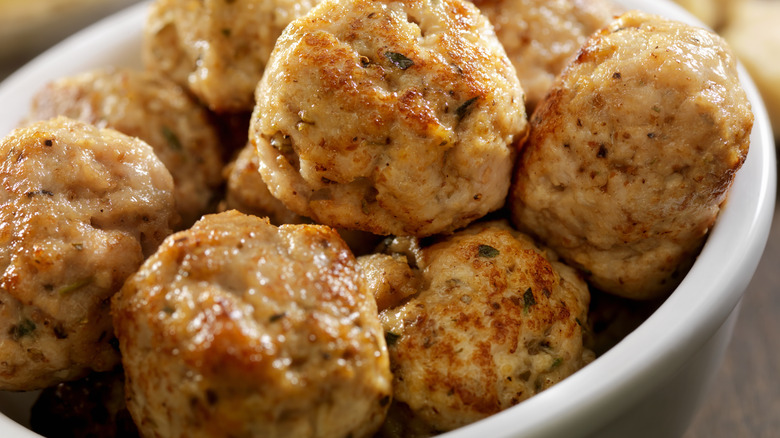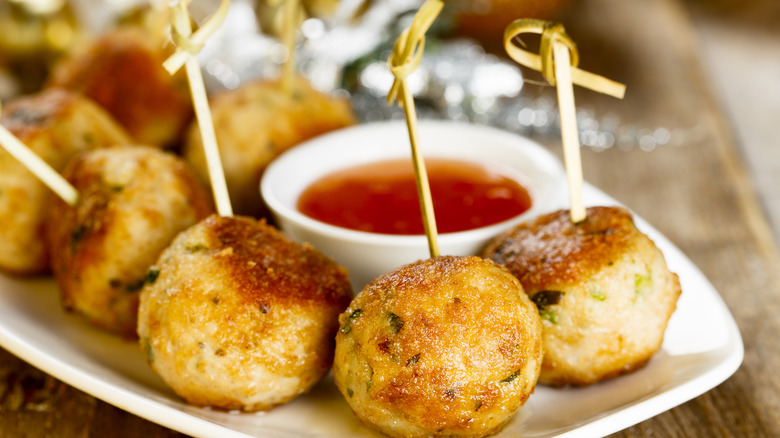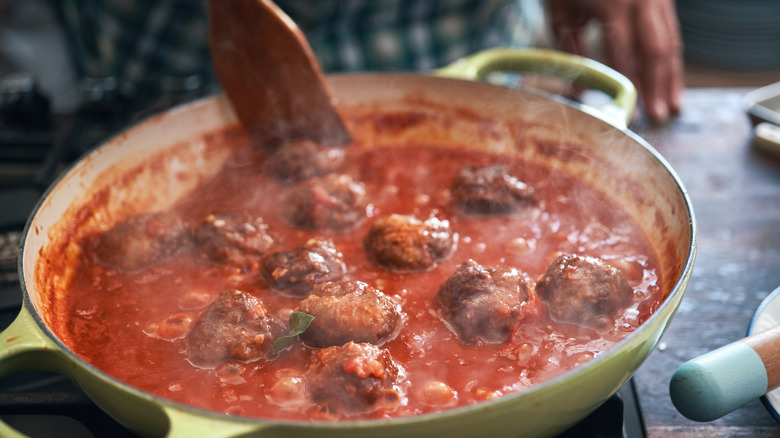How To Prevent Turkey Meatballs From Turning Into A Dry Mess
Ground turkey has long been a common replacement for beef in dishes like burgers, meatballs, and bolognese. It's lean and packed with protein, and its clean flavor profile means it can be adapted to many dishes. The only problem? That leanness can cause some serious dryness. Fortunately, there are plenty of techniques to keep turkey meatballs moist and juicy.
One great trick is to mix roasted and pureed eggplant in with your meatball mix. The silky-smooth eggplant will disappear into the mixture, and you won't taste it in the final product. Instead, it will add much needed moisture to the dish.
Another option is to turn to dairy. Greek yogurt, for example, can keep things dewy and light. The added liquid it provides will further help the meatballs from overcooking quickly. Dairy also comes into play with a common meatball ingredient called panade, which is stale bread or breadcrumbs soaked in milk. Meatballs always need a binding element, and the starch of a panade helps accomplish this. Coincidentally, it also adds liquid, which makes your meatballs more tender. Turning to dry breadcrumbs, on the other hand, will result in a dryer and denser creation.
Mix and cook your meatballs gently
Most great meatballs should have a texture similar to a burger. They should hold their shape nicely, but also be tender and loose when cut into. Unless you're after a springy Swedish meatball, you don't want the snappy texture of sausage, for example. Nailing the correct texture will help you keep everything moist, too.
One easy way to do this is to never over-mix your meatball ingredients. If you blend them for too long, the protein structures in the turkey will start to bind together. This gives you a more compact, tighter product. Instead, mix the meat and ingredients gently, as you would with a burger, just until everything comes together.
In the same breath, you should cook your meatballs gently, too. You can quickly brown them under the broiler or sear them in a pan, but make sure you don't overcook them. After the exterior is browned, braise them slowly in a sauce until they're cooked through. This will let them absorb tons of flavor and moisture from the cooking liquid. This technique will go perfectly with classic Italian-American spaghetti and meatballs, where the meatballs and marinara will both become more flavorful when simmered together.
Pack your meatballs with umami to boost the turkey
Now that you have the techniques to keep your meatballs juicy, what about making them extra savory and, well, beefy? One quick way is to use regular ground turkey, rather than ground turkey breast. The regular option should include dark meat, which is a more flavorful and juicy part of the bird. Some supermarkets and butchers will even carry ground turkey that is entirely made from dark meat.
Umami rich add-ins are also an easy way to boost your meatballs' flavor. Pecorino Romano or Parmesan cheese are options that play well with many meatball varieties. They are full of glutamates, which will draw out the meaty flavor of turkey.
If you want to take your meatballs in a Southeast-Asian direction, try using fish sauce to play on classic Thai and Vietnamese flavors. Soy sauce will also work well here, giving you a major glutamate boost. Have a tin of anchovies in your pantry? Throw 'em in, and reap the rewards of their savory flavor. Just keep in mind that any of these add-ins pack a lot of sodium, so don't add too much lest your dish become too salty.



